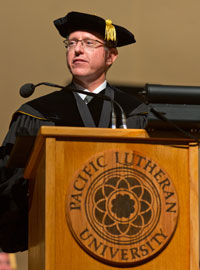Page 228 • (2,305 results in 0.152 seconds)
-
at the institution four years ago. Then, when it came time for him to step into an acting presidential role — one neither of them dreamed would become permanent — it was, once more, an opportunity to serve. “When I was (a student) at PLU, there was a really strong emphasis on service and trying to figure out what you could do to assist other people, figuring out how you could use your individual skills to help someone else,” Melinda said. She wanted that for Allan, who was searching for
-
organized. We worked together to build this data set.” Travis says she also learns a thing or two from her students through that mentorship model. “The fun part is, when I go to teach capstone,” she said, “I don’t know what I’m going to learn.” Still, Travis said, students gain two important skills through close collaboration with experienced faculty members: self direction and practical application. “Nobody tells you the answers,” Travis said of self-guided research projects. She noted that the work
-
a glimpse into the lives of professionals who practice what PLU preaches. “The key is to bring in successful people and reinforce what we do,” Dickerson said. And it works. He said the players learn valuable skills and build meaningful relationships through those networking opportunities. Dickerson proudly touts the near-perfect graduation rate and post-graduate success of his former players. Despite their success after moving on from college, Dickerson says many of them stay in touch. He
-
examination before it is given); or Fabricating information, such as data for a lab report; or Collaborating with others on assignments without the instructor’s consent; or Cooperating with or helping another student to cheat; or Other forms of dishonest behavior, such as having another person take an exam for you, altering exam answers and requesting the exam be re-graded, or communicating with anyone other than a proctor or instructor during an exam. Plagiarism occurs when one omits, misrepresents, or
-
it is given); or Fabricating information, such as data for a lab report; or Collaborating with others on assignments without the instructor’s consent; or Cooperating with or helping another student to cheat; or Other forms of dishonest behavior, such as having another person take an exam for you, altering exam answers and requesting the exam be re-graded, or communicating with anyone other than a proctor or instructor during an exam. Plagiarism occurs when one omits, misrepresents, or
-
practical application of electrical, programming, and artistic skills needed for theatrical lighting design. Prerequisite: THEA 254. (4) THEA 360 : Theatre History: Origins - ES A survey of theatre's origins as an institution that reflects history while forming new social values and ideas. (4) THEA 362 : Musical Theatre History - ES A survey of Broadway musical theatre as an institution that reflects history while forming new social values and ideas. (4) THEA 365 : Theatre History: Modernism - ES A
-

PLU start the process of helping you discover your Wild Hope right at the start. You have already been engaged in a lively and stimulating Orientation Program for the past several days. You have already begun asking yourselves what we call the Big Enough Questions: “What skills do I have?” “How can I best matter to other people?” “What legacy do I want to leave behind?” Our professional staff and faculty members have been prodding you to take full advantage of the smorgasbord of opportunities we
-
directly for the checklists. heather.graves@plu.edu Theoretical or Academic Definitions Scholars have analyzed the concept of preceptor and preceptorship, too. Although some people use the term mentor as synonym, there are distinguishing characteristics of a preceptor. For one, the relationship between preceptor and student is more time limited. The focus is also more intensely aimed at acquiring the knowledge, skills, and judgement required by an individual course’s goals and objectives (Billay
-
three decades, a majority of his 40-year career in education. He’s been at the district’s helm for 11 years. Beyond his commitment to the partnership with PLU and his full-time administrative work, he serves on the boards of the Junior Achievement of Washington, Latino/a Education Achievement Project, Parkland-Spanaway Kiwanis Foundation, Pierce Center for Arts & Technology and the Pierce County Skills Center. He also is a longtime member of PLU’s Administrative Professional Education Advisory Board
-
landforms. Includes labs. Prerequisite: ESCI 201 or consent of instructor. (4) ESCI 336 : Geochemistry Study of fundamental geochemistry principles with focus on applications to investigations into a wide-range of earth and atmospheric processes and systems. Analysis and interpretation of student-collected and published field and lab data. Includes labs. Prerequisite: ESCI 201 and either CHEM 104 or 115 or consent of instructor. (4) ESCI 342 : Climate and Earth Systems Study of climate and climate
Do you have any feedback for us? If so, feel free to use our Feedback Form.


